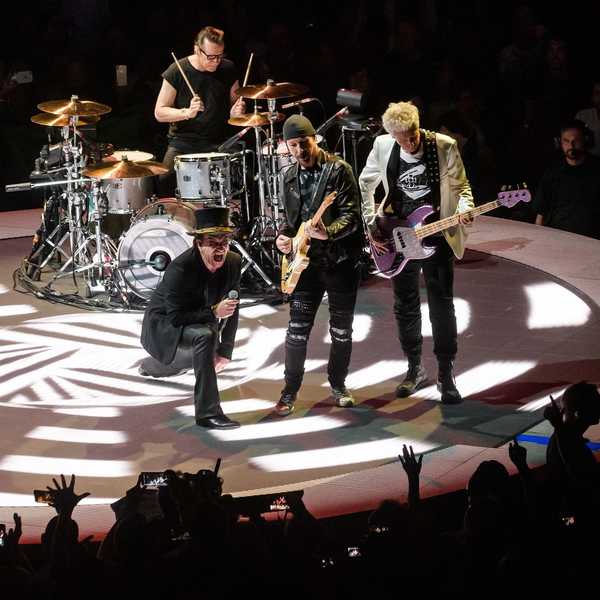By Dave McKenna, Washington Post
Recent U2 roadshows had the feel of overbudgeted Broadway musicals, where tunes were subservient to pyrotechnics and it was clear that singer, frontman and resident speechifier Bono had to hit the same stage mark at the same point in the same song in every city because the props compelled him to.
The legendary Irish rockers are taking a different tack these days. For its Sunday appearance at Capital One Arena, U2's main stage had only microphones, instruments, band members and enough stomp boxes to make the Edge's guitars as reverb-y and echo-y as expected. There wasn't a confetti cannon or balloon drop anywhere on the premises. Yet from beginning to end of a joyous, two-hour-plus set, less sure seemed like more.
The band ranged far and wide when picking the set list. The only thing off limits this time around was material from "The Joshua Tree," the 1987 multiplatinum monster LP that band members decided has provided too much material to U2 shows for too long. (Plus it got its due just last year on a tour devoted to the album's 30th anniversary.) That pronouncement meant more time for tunes from the band's 14th and latest studio album, 2017's "Songs of Experience," as the set opened with a trio of newish numbers: The somber if overly Coldplayish dirge, "Love Is All We Have Left," the rocky funk of "The Blackout" and fuzzfest "Lights of Home."
The songbook of U2, whose roots go back to Dublin in the mid-1970s, is more than long and stout enough to survive taking any single album out of the mix. "We are called U2 and this is our new song!" Bono said with a wink as the Edge banged out the classic riff that opens 1980's "I Will Follow" on his pointy Gibson Explorer. With the rhythm section of drummer Larry Mullen Jr. and bassist Adam Clayton staying in place and holding down the bottom end, the Edge hopped around just like he did in vintage videos for this tune, which with MTV's help helped launch U2 as a global phenomenon all those years ago. A large portion of the arena joined in the jumping. Then came "Gloria," with yet another iconic rock guitar riff and a chorus that had the whole crowd smiling and shouting along. That led directly into the impossibly blissful "Beautiful Day," and U2 was hitting rapturous heights few arena bands can hit.
Bono, 58, calmed things down for "Iris," another newish song that mulls his relationship with his mam, sung while a quaint and sepia-toned wedding video, ostensibly of his folks, played on the big screen. Another personal ode to his past came with 2014's "Cedarwood Road," with Bono crooning about growing up in a neighborhood where, it turns out, the streets have names after all.
After an intermission the whole band appeared on a small, round stage at the back of the arena and did 2004's "Vertigo," maybe the band's last great arena rocker, as the Edge kept things hopping and Bono threw in several bars of David Bowie's "Rebel Rebel."
At least one of the few props built into the current stage show didn't work as planned. Like when Bono dropped some lines from the Rolling Stones' "Sympathy for the Devil" and broke into his satanic Mr. MacPhisto character. The complex software that was supposed to turn his boyish Irish face into a devilish visage for the arena's video screens got so glitchy that it was hard to tell, well, what the hell was going on. A subsequent straightforward and mostly unplugged version of "You're the Best Thing About Me," another new number that sounded like a spacey Donovan tune, brought things back under control.
Bono's windbaggy side never came close to suffocating these proceedings, either. He stayed away from mentioning politicians by name and continually dropped the word "compromise" into the discourse. Before "Staring at the Sun," he attempted to talk about the peace movement in Ireland in the 1990s, but was derailed by a shrieking fan and gave up after flashing an obscene gesture with a big grin. Then he and the Edge crooned the tune while looking into each other's eyes much the way Sonny looked at Cher during vintage performances of "I Got You Babe."
Not that the singer's toned-down banter meant U2 ignored man's inhumanity to man. During "Sunday Bloody Sunday," video screens flashed news of the 1974 car bombings in Dublin that killed about two dozen people. Protest signs and graffiti from that horrible era in the Irish capital city were shown on the big screen along with photos of people killed, and a message flashed asking for "Justice for the Forgotten." (No one has ever been charged for the attacks, though members of the Ulster Volunteer Force, a Protestant group loyal to England, claimed responsibility.)
Then there was "Pride (In the Name of Love)," from 1984's "The Unforgettable Fire," which began with videos of Nazi marches and Ku Klux Klan recruiting drives taken at last year's march in Charlottesville. Bono brought even more contemporaneousness to the proceedings by saying he was singing the tune for the "dreamers trapped at the border."
This being Father's Day, Bono dedicated the last tune, the new "13 (There Is a Light)," to "the fathers who are 13 . . . in their heads." He took one last walk down the stage's catwalk, toward a small rendering of his boyhood home that was set up at the other side of the floor. Then he kept walking all the way out of the arena, while still singing the climactic lines, "There is a light/don't let it go out."
Decades be damned, this band's light shows no signs of dimming.
© 1996-2018 The Washington Post
(Photo by Kyle Gustafson)


 Skip to top
Skip to top
Leave a comment